
Mandy Hutchinson Doyle, 44, and Trisha Doyle, 35, from South Shields, have been together for five years and were the first LGBT couple to marry in the North East. Mandy has three children – Jade, 20, Holly, 19, and Cole, 17 – with her ex-husband. The couple have a dog and six cats, two of which are deaf.
BuzzFeed News: At what point did it hit you that your relationship was finally legally recognised?
Mandy: The night of the wedding we were sitting in bed in a hotel in Newcastle with all the cards and gifts spread all over the bed. We just looked at each other and smiled and knew. We just knew we were legally together; we didn’t need to say a single word.
Earlier that day, you were exchanging vows, the first gay couple in the North East ever to do so. Did you feel that sense of history? Or was it mostly personal?
M: It was a bit of both for me – I was looking at Trish, thinking, “Wow, I’m getting to marry her!” I was bursting with pride because I’d got my woman, and because it was huge what we were doing – government legislation. It’s not very often you get legislation where you can pop champagne corks.
Trisha: It was great that we were the first, but the fact we were getting married to each other was the big thing. Even today, when I make a phone call and say, “It’s my wife”, even that is strange. I still say partner sometimes.
M: I love saying “wife”. I’ll say I’m married to someone phoning up about something. They’ll say, “What’s your husband’s profession?” and I’ll go, “My wife’s actually…” Whenever I say that, I feel really cocky and brilliant.
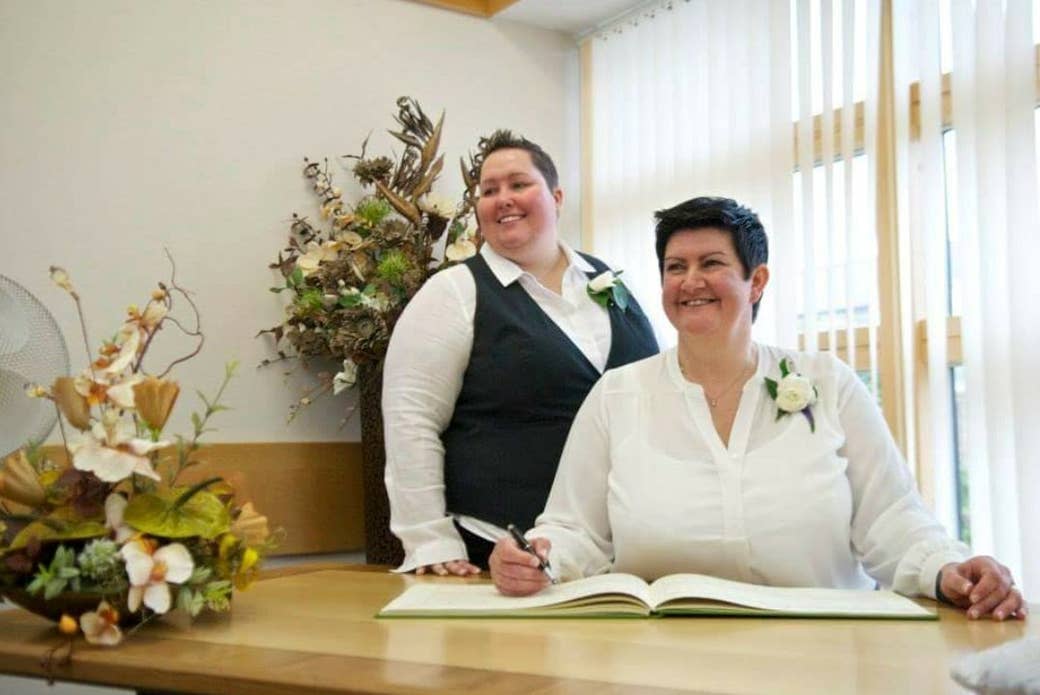
Why was it so important to get married – and on the first day?
M: Because we wanted to be the same as everybody else – why should there be a difference? We loved each other and that was all that mattered. We were engaged for over a year and didn’t tell anyone, because we wanted to wait until the new law was passed.
T: And having it on the first day was because it’s historic – we’ll always have that. In fact, after booking the first slot we even rang back up and pretended to be someone else asking for an earlier slot to see if anyone could get in there before us, but they said no.
M: I wanted to marry Trisha, no matter what, but also I love the history of where I live and to be part of that history, part of my town’s history meant a lot to me.
What difference has being married made to your lives?
M: It sounds like a small thing, but it sums it up really – when I was filling out the paperwork for my new job, I put down Trisha as my next of kin and benefactor if anything happens to me at work. It was poignant, knowing that Trish would be safe and covered. Before 29 March that wasn’t the case.
T: It just feels right. You’re brought up to fit a mould, knowing you’re going to get married and have kids, and when you realise you’re gay that’s taken from you. But now you can say to your kids, if they’re gay, “You can get married.”
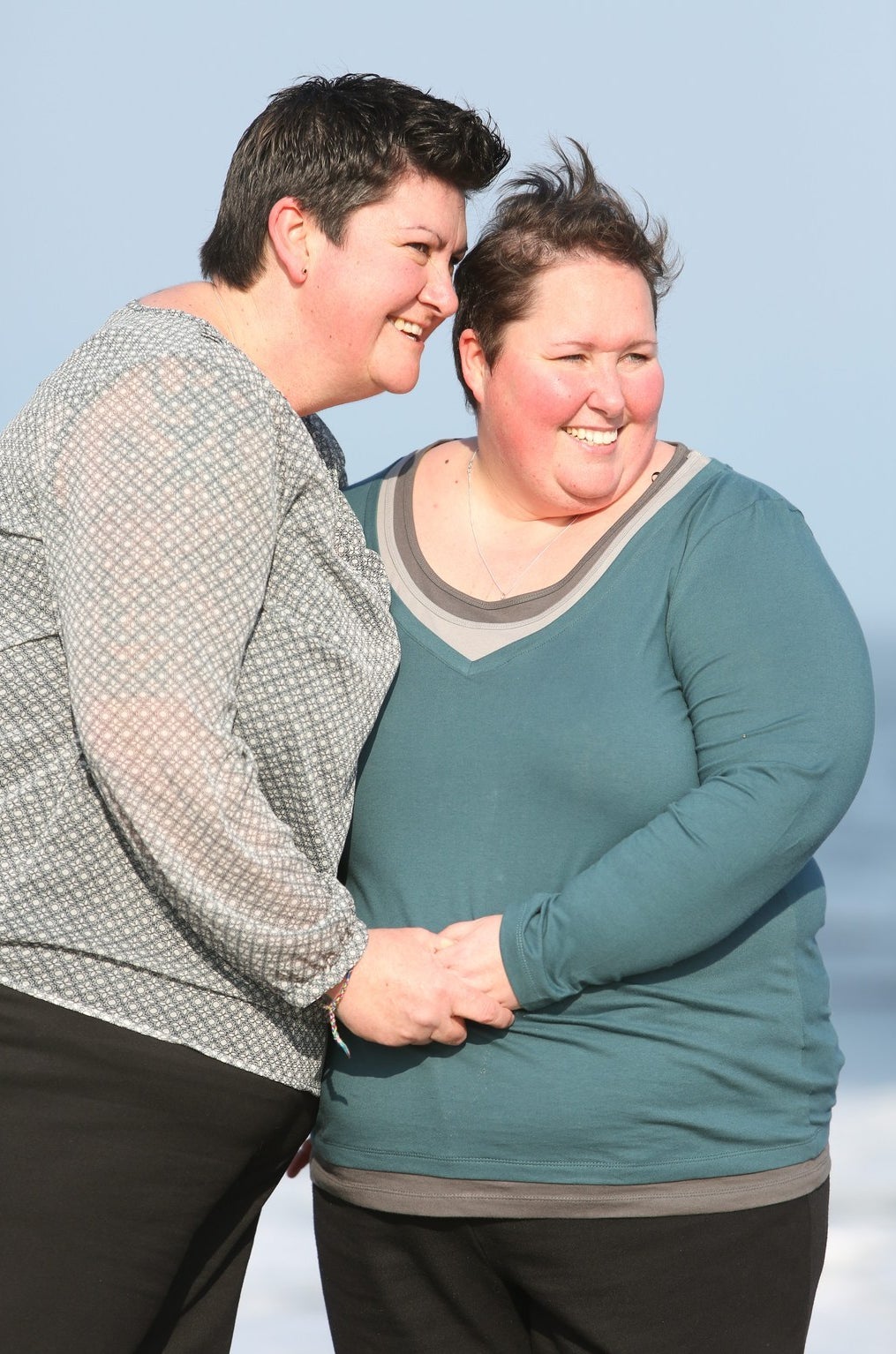

What do you argue about?
T: Absolutely everything. What was it yesterday? Dog food. Where to put the dog food. Also, I sit with my toes under her on the settee; that drives her mad.
M: Before we were married we would fight all the time.
T: I’d pack my bags. I wouldn’t even unpack it half the time, so it was ready!
M: And since we got married there haven’t been any pack-your-bags arguments. Getting married has made that difference. Isn’t that strange? Everything’s mellowed.
T: It’s more homely, there’s more security. I feel more secure.
Do either of you have a tendency towards jealousy?
[Trisha stares at Mandy, who starts laughing]
Does being married take any of that away?
M: No!
What happened on your honeymoon?
M: They’d upgraded us to the penthouse apartment, overlooking Newcastle, but we spent the whole of it in bed in the hotel, ill with flu.
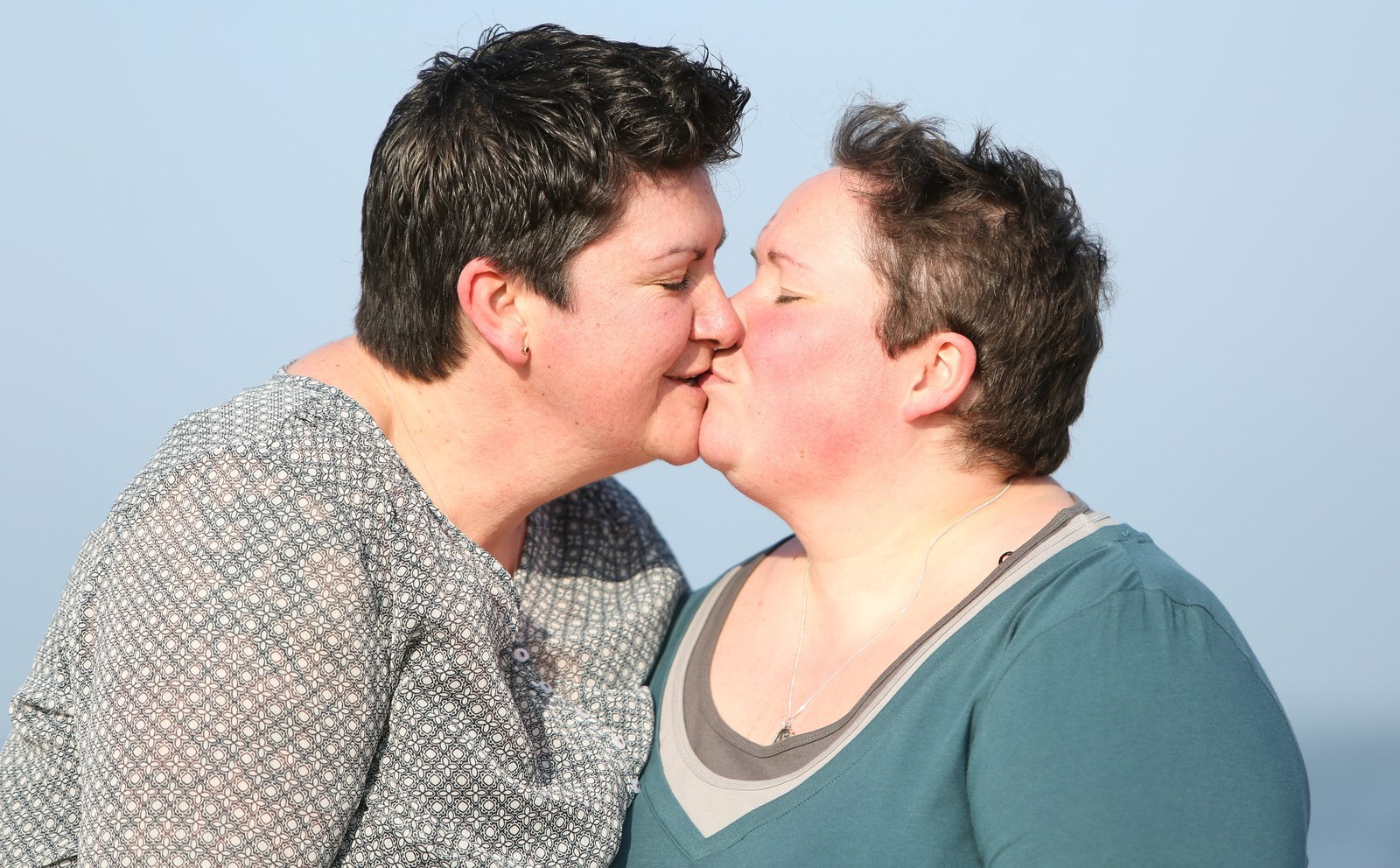
But even with the snot, was it romantic?
M: Yeah it was. I’m really tight with money…
T: Oh my god! Horrendously so.
M: I’M FRUGAL. Is that the right word?
That’s what tight people tend to call themselves…
M: I’ve got three kids to look after! We were so poorly I got room service – I would never ever get room service but I thought, “We’re not well, so we’re pushing the boat out.”
T: But that itself was romantic. Having three kids, and not having loads of money, the fact we were in a hotel for two nights was absolutely amazing. Without the candles, or whatever else, it was romantic in itself. We just sat and chilled. It was lovely.
What do you remember now about the wedding day?
M: It was manic – there was only three months between finding out we could do it to the actual day, and we had very little money, it was proper shoestring, so we did everything ourselves. We couldn’t afford to get anyone to do the buffet, so on the night before we were up making the food. Trisha arrived in a massive great white Defender Land Rover,
brilliant! I came in this beautiful Audi people carrier. We were sitting in our cars waiting for the other person to get out.
The BBC had phoned the day prior, which I thought was someone winding us up. They wanted to come and film the whole ceremony. We said no to that but we didn’t mind them filming afterwards as we were coming out the registry office.
T: And I was really ill, dizzy and flu systems. The whole day was a blur.
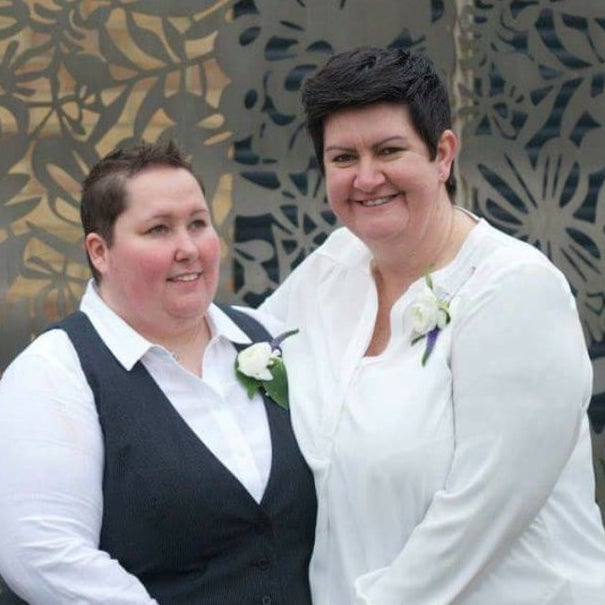
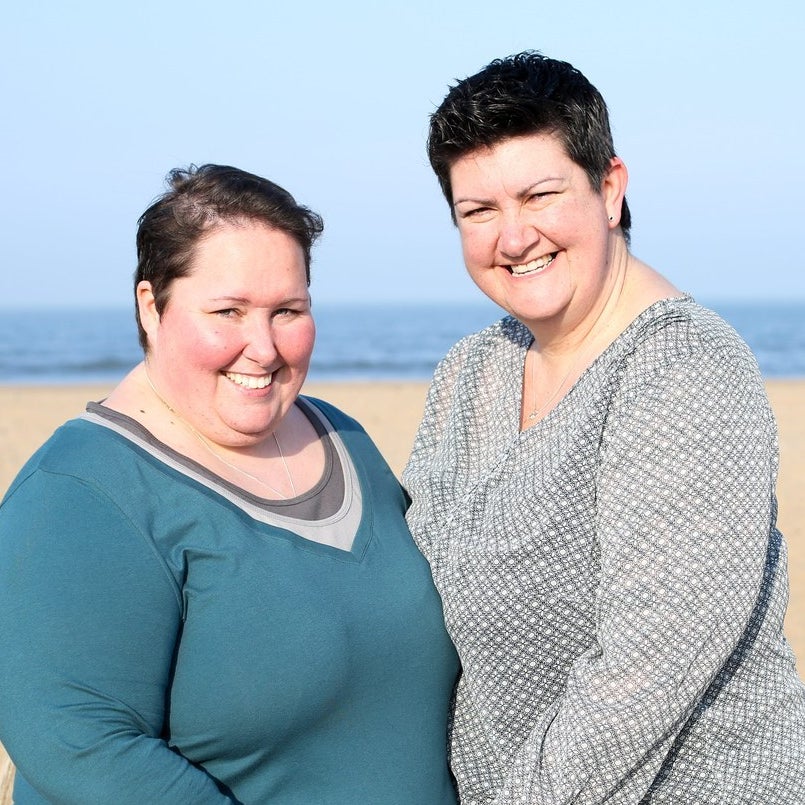
How did your children feel about the fact their mum was making history?
T: They were pretty blasé about it – they’re teenagers.
M: My eldest, Jade, is very hyper and excitable so any sort of occasion she’s up for. After Trisha and I met, a few years ago, she went into school announcing, “My mum’s a lesbian!” My middle child, Holly, has always been so supportive and my son Cole, from being a proper lad’s lad, he’s just gone with the flow. The history thing for him wasn’t…his generation couldn’t see what the big fuss was about – it’s quite normal to them.
T: I’ve had Mother’s Day cards two years in a row now! Getting a card off a non-biological child is a true gift. They were teenagers and they accepted me.
You obviously did a good job with them to begin with….
M: Thanks. You’re gonna make us cry. Getting all emotional now.
What are you doing for your first wedding anniversary?
T: We’re going to go back to the bar where we had our reception.
M: Someone’s kindly given us a £50 voucher to go. We don’t know whether to invite loads of people or whether it’s just going to be us. I’ve got four days off work, and we have a caravan and I was hoping, weather permitting, we’d get away.
T: The million cats, the caravan…we’re such a cliché.
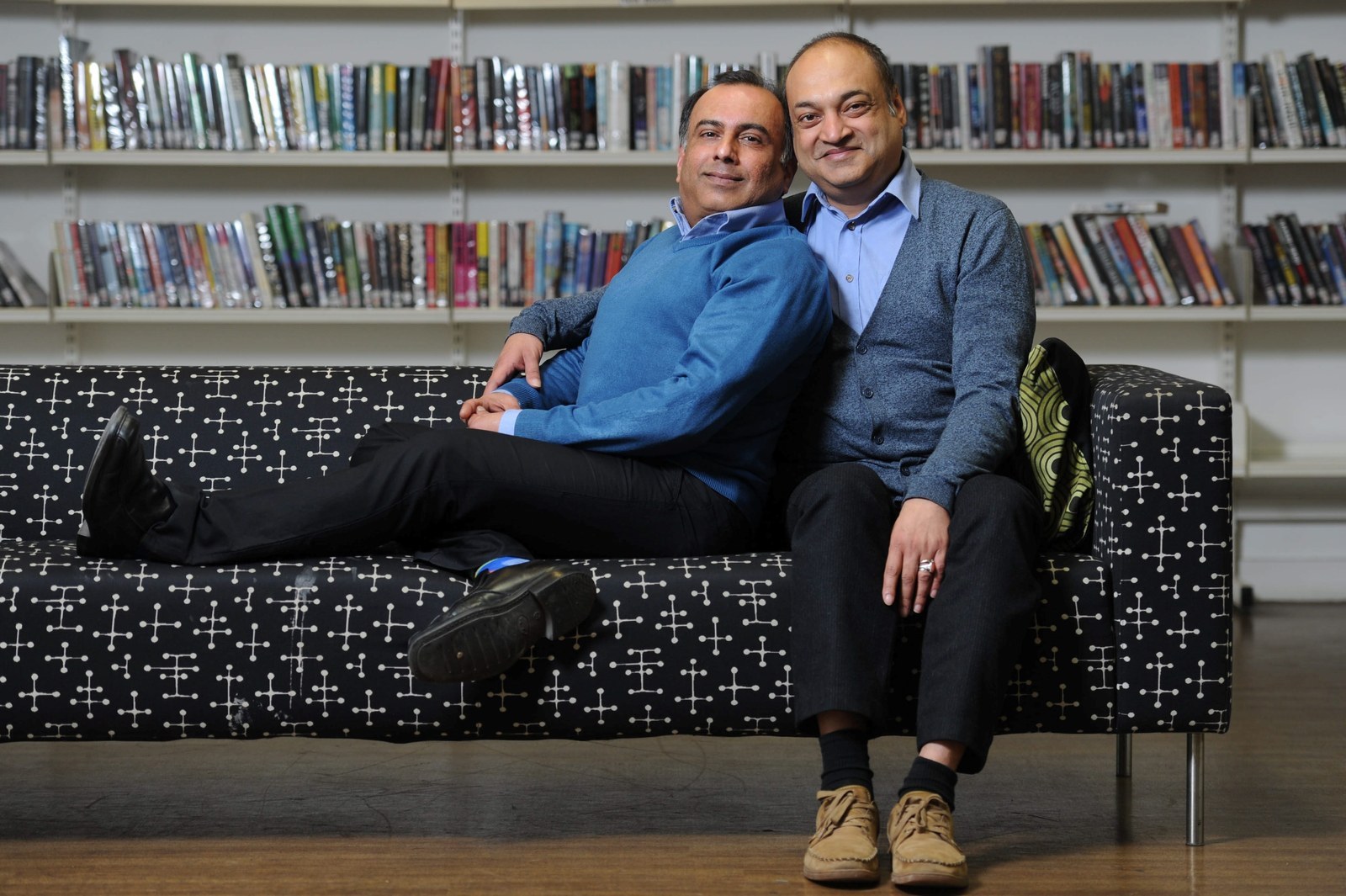
Subodh Rathod, 50, and Niranjan Kamatkar, 49, run an LGBT arts organisation and have been together for 20 years. They got married on 29 March in Haringey, north London, at 9.30am, in front of Lynne Featherstone, the MP behind the same-sex marriage bill.
They became the first gay couple of Indian heritage to marry, with the whole thing live-streamed to Niranjan’s family back in India.
BuzzFeed News: Did you at any point in the day start weeping?
Subodh: For me, it was just after the registrar had announced us as “husband and husband” – to hear those words, they will always echo in my ears. We would never have thought 20 years ago that an official would actually utter those words in the presence of not only us but also family and friends.
How did it come about that you were able to get married on the first day? And did one of you propose?
Niranjan: [Laughs] When we heard about it, Subodh said, “Oh, why don’t we get married?” We always thought we were married anyway, and a number of friends and family saw us as a couple anyway. It felt naturally like it was falling in place because we had worked towards marriage equality and supported the local MP, Lynne Featherstone – so I thought, if possible, let’s do it on the first day.
We went to the register office and they said the first slot is available but they said, “Is it a civil partnership?” They didn’t even know about it. We said, “NO! It’s marriage! It’s marriage!”
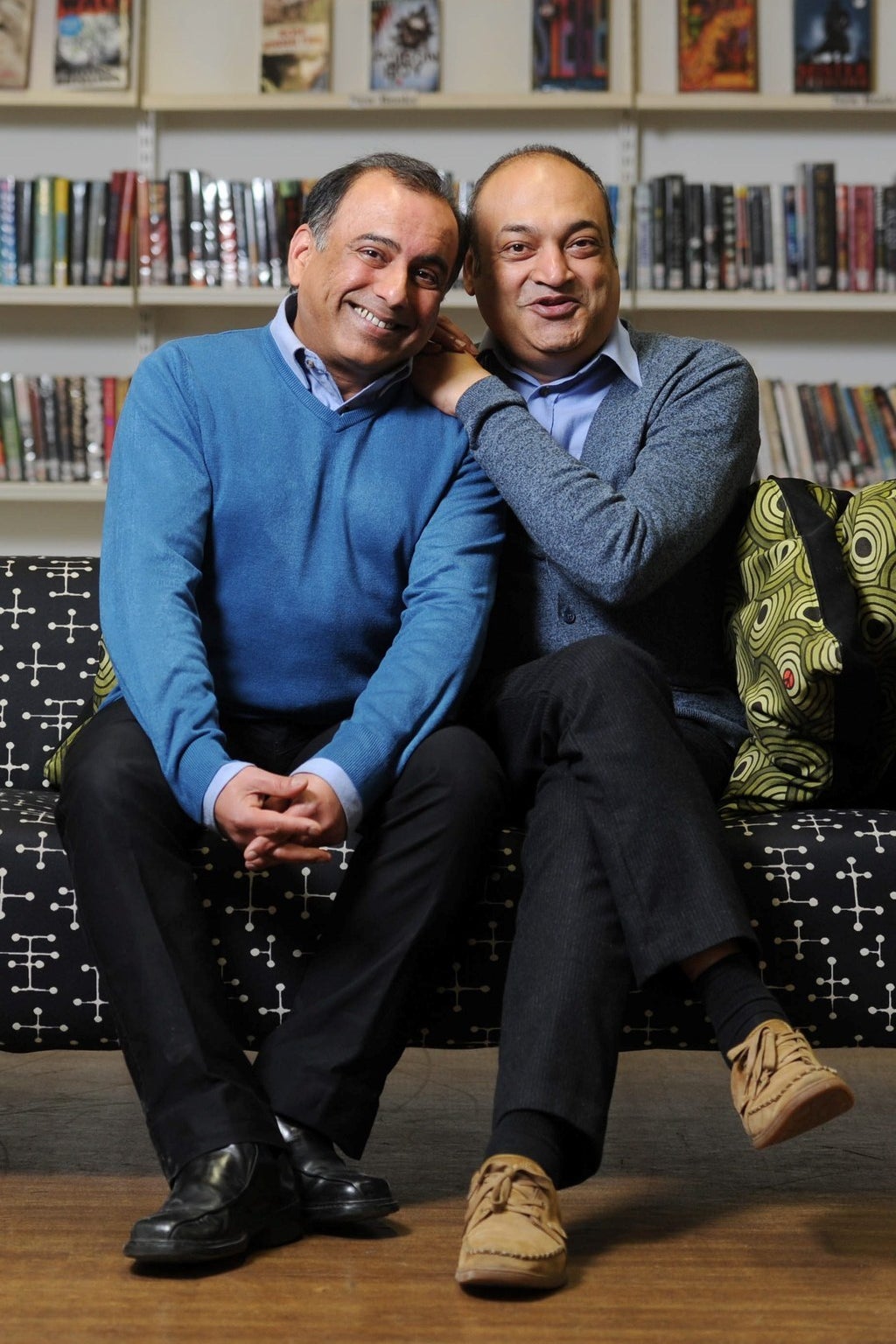
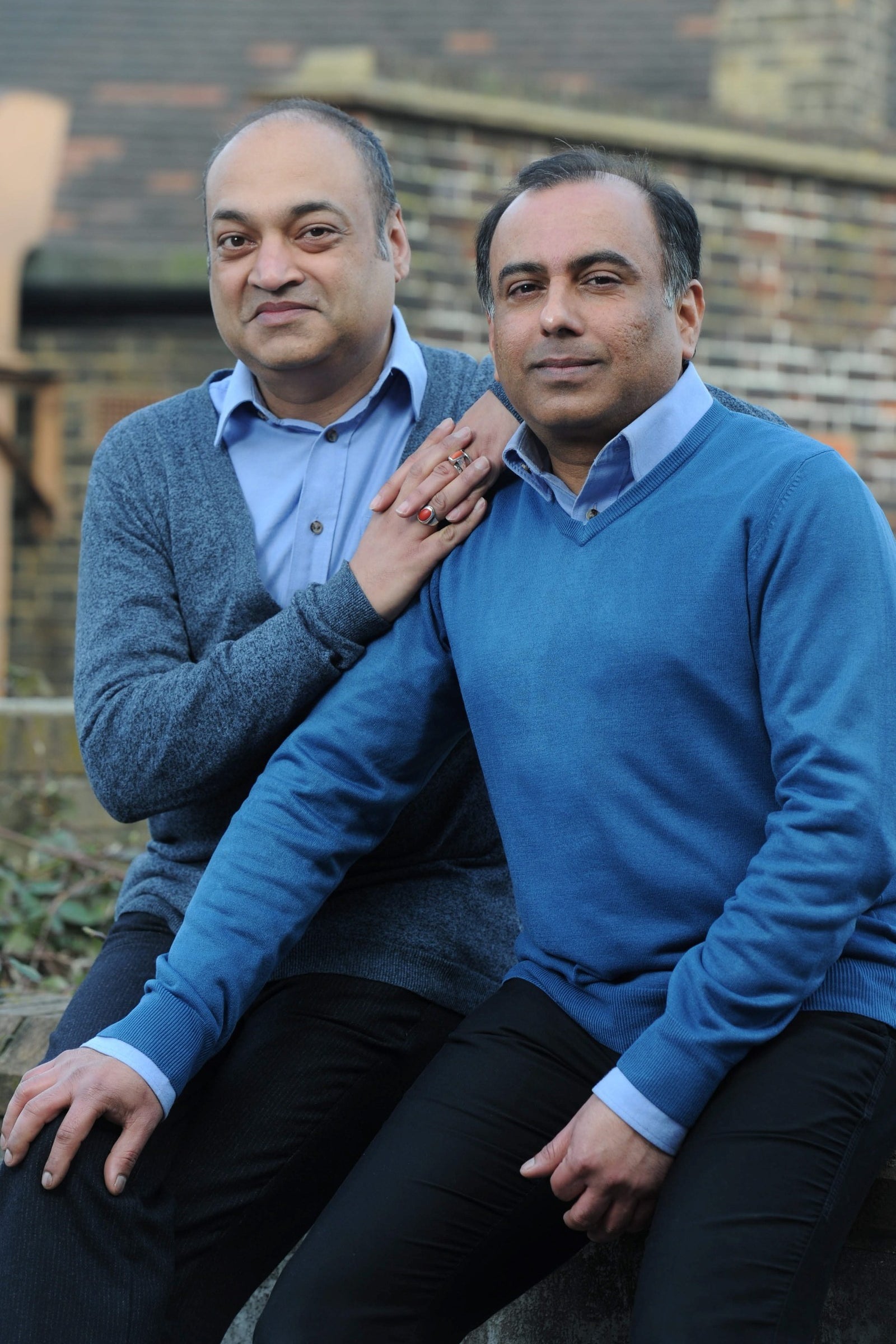
They didn’t even know in the register office?
N: No! And then the clerk went back inside and asked and came back and said, “Yeah, it [same-sex marriage] is coming,” but they didn’t have the paperwork in place so they just booked a slot for us on the first day and said, “We’ll confirm it on 13 March.”
That’s not a long time to prepare…
[Both laugh]
N: Well we had gone ahead and prepared anyway.
S: We were very lucky. And for us it had to be marriage, not a civil partnership. If you you’re going to have equality, it needs to be on equal terms. Civil partnerships were always seen to be a compromise, second best. And we had already exchanged vows in a ceremony in India three months after we met. In our wedding here we even incorporated some of those same vows, about how we see life now as independent and dependent. It was also in the presence of the five key elements which are vital in the Hindu ceremony – earth, air, fire, space, and water.
How did it go?
S: We relied on family and friends to help pull the day together. We were up until 2am the night before trying to finalise everything. So it felt very much like a traditional wedding, because up until the last moment on the morning my aunts, mother and cousins were all screaming and shouting and making sure they were all ready and getting their best saris on, and at the same time making sure we were ready.
Those are the moments that you can never really encapsulate in words. The spirit of the moment was so great, not just with us, but that family members had taken ownership of it. It defies a lot of stereotypical assumptions people have about Asian families and what they might have to say about same-sex marriages. All kudos to my mother who despite the fact her command of English is quite limited, still managed to tell reporters: “Instead of having a son and a wife, I now have two sons.”
For me, that encapsulates the whole essence of it. Even though the family had recognised us as a couple the mere fact we are married legally made sure they are now able to say we’re a couple. That makes a world of impact.
N: I said to my mother, “We’re getting married” and she said, “I thought you were already married. Aren’t you?” And his niece said, “Why do you want to get married? IT’S MY TIME!” She’s 20. And we lived with Subodh’s parents since I came to England – it’s 18, 19 years now. His father passed away but we still live with his mother and we get along.
One time in India Subodh had an accident, he had to give an address so he gave my parents’ address, and when I heard, I went to my parents’ place and my mother was feeding him with a spoon, taking care of him in bed.
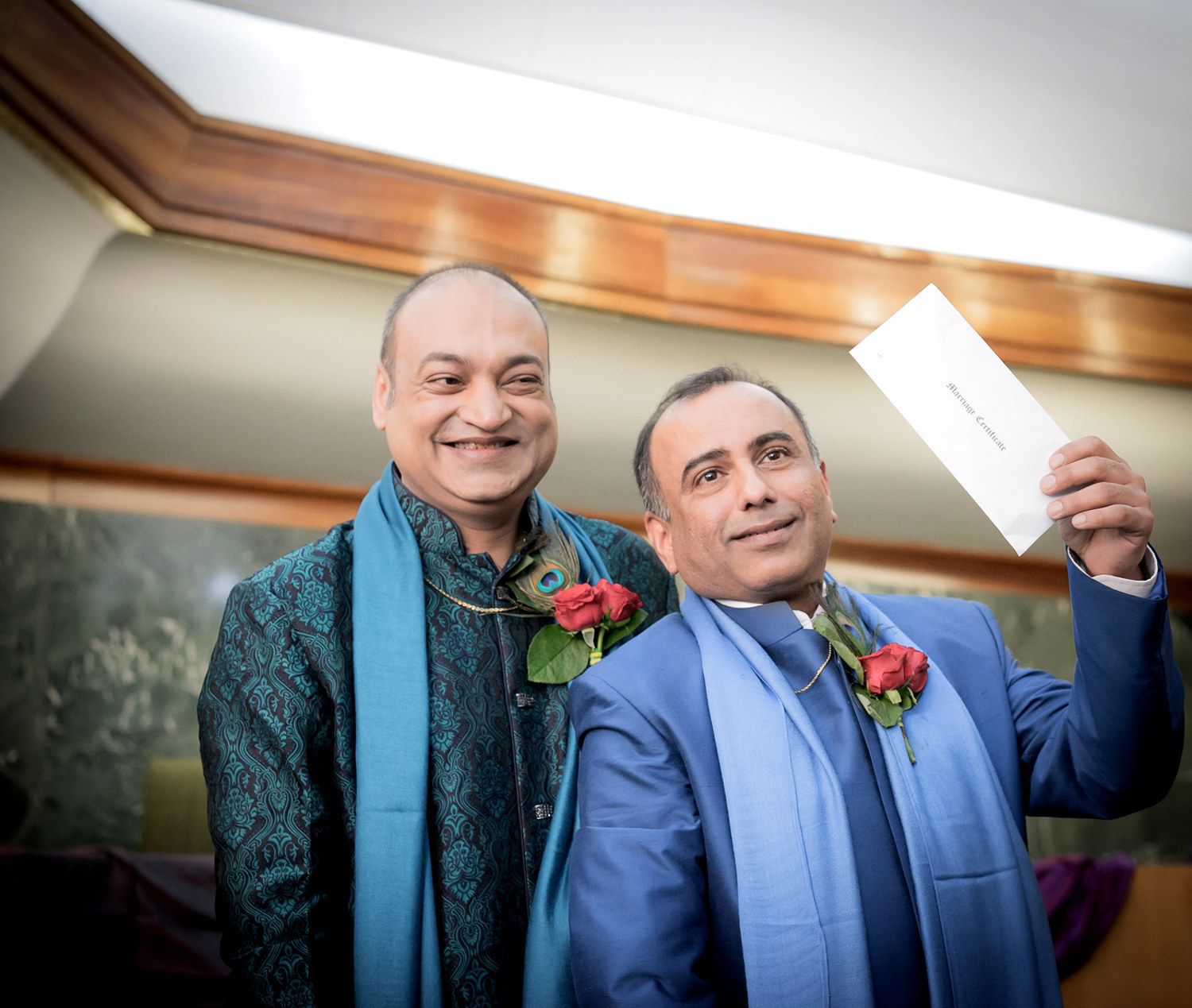
How much did you feel aware on the day that you were making history?
S: For me it was, “Yes, I’m aware” but there was hope attached, that it might allow other gay couples to make the same move. Other Asian community members have a different experience of family and friends and so it’s sending out that positive message. And showing it’s not just us, but we had our family members there, supporting it, so it’s possible.
N: I had a real sense of the sacrifices made by people before us. There was an enormously historic sense to it all. When you’re going through the ceremony you’re living that moment and there’s something to that moment which is also for future generations. Being part of that was a real privilege on the first day.
What effect has being married had on you?
S: Being married legally does make a difference because you feel people have to now legally accept the fact that we are a couple. There’s a sense of empowerment we get just by being able to utter those words; yes, we’re married, which we wouldn’t have had a year ago.
N: We were coming back to the UK and the passport official said, “Are you two related?” And we could proudly say, “Yes, we are husband and husband, we are married.” That’s a small thing to some people, for a heterosexual couple, but for us it’s important.
S: We feel the difference every day, you live the difference every day. A year on, the interactions you get from those who are aware we’re married are incredible, because they treat you slightly differently, more seriously, and I suppose it’s getting that stamp: you’re married now.
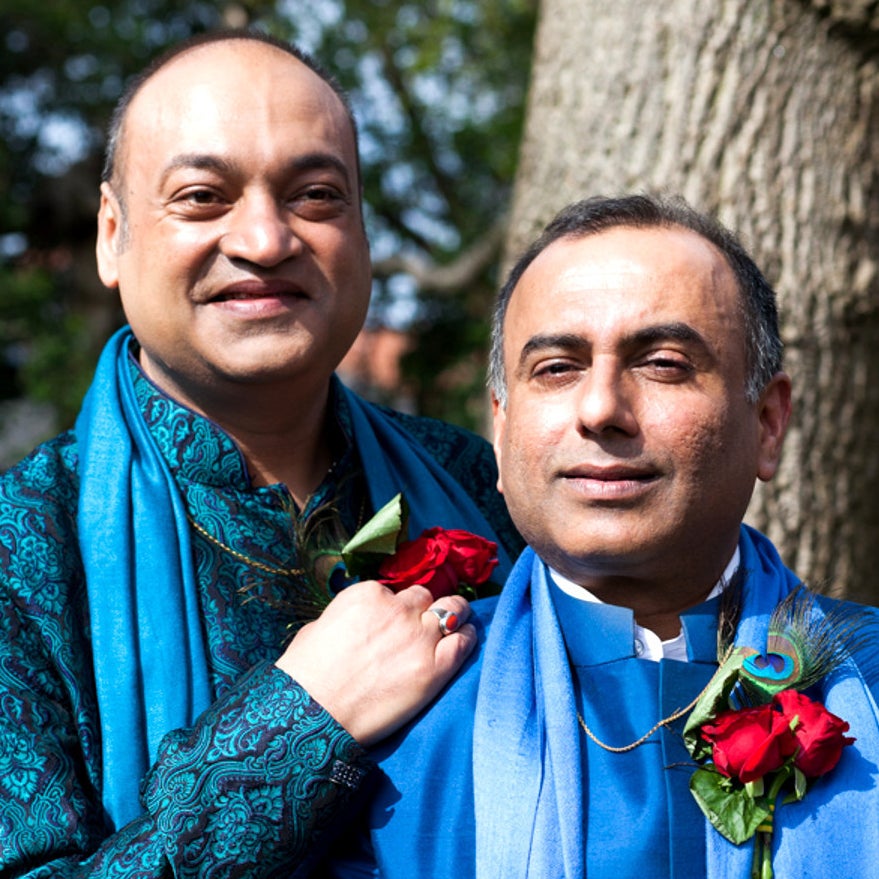

How long did it take for you to get used to using the word husband?
N: We’re still not used to it! We’ve been saying “partner” for years.
How do you feel now looking back a year on from the wedding?
N: We don’t regret it!
S: I would only hope that it’s something that not only other countries, but all communities, eventually learn to accept.
What did you love most about each other?
N: His sensitivity. There’s something very charming and delicate in his approach to dealing with any situation. He stands up for principle – I admire that even now.
S: Apart from his cooking? His mind. He was the library I was always searching for.
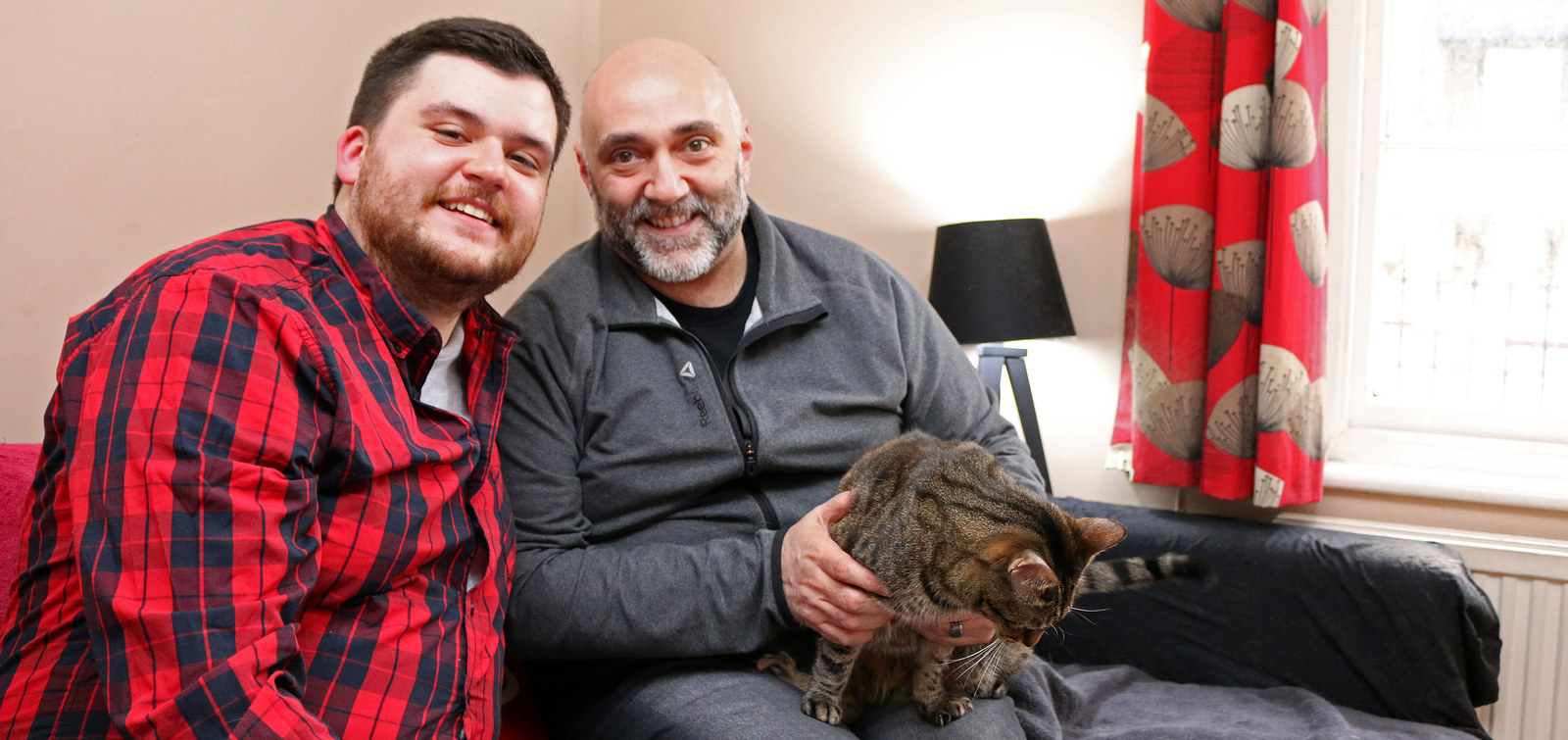
Aarron Erbas, 24, a PhD student, and Louis Monaco, 47, a psychologist from New Jersey, married in Islington, North London, at 10.30am. Three years ago they met in a pub where Aarron had just been stood up. They have two cats and love all things French.
BuzzFeed News: Lou, growing up in New Jersey in the ‘70s and ‘80s, could you have begun to imagine that you would be able to get married?
Lou: Not at all. There weren’t even gays on TV. You couldn’t walk down the street holding hands. I didn’t think gay marriage would happen in my lifetime. And in the US they’re still struggling with it now. Here they had the civil partnerships and I figured they would just leave that in place and then suddenly it just happened. So for me there was something important about marrying on the first day, being a pioneer – it was symbolic.
Aaron: I can’t imagine how it must have been in your generation…
L: Oh no she didn’t! “YOUR GENERATION.”
A: [Laughing] I’m so sorry.
Who proposed?
A: I did. Well, actually I proposed three times, but the third time was with a ring.
L: I said no twice: the age difference.
A: But also I had said, “I want you to say no so I can ask you three times.” That to me was symbolic, the mind/body/soul thing.
L: He wore me down [laughing].
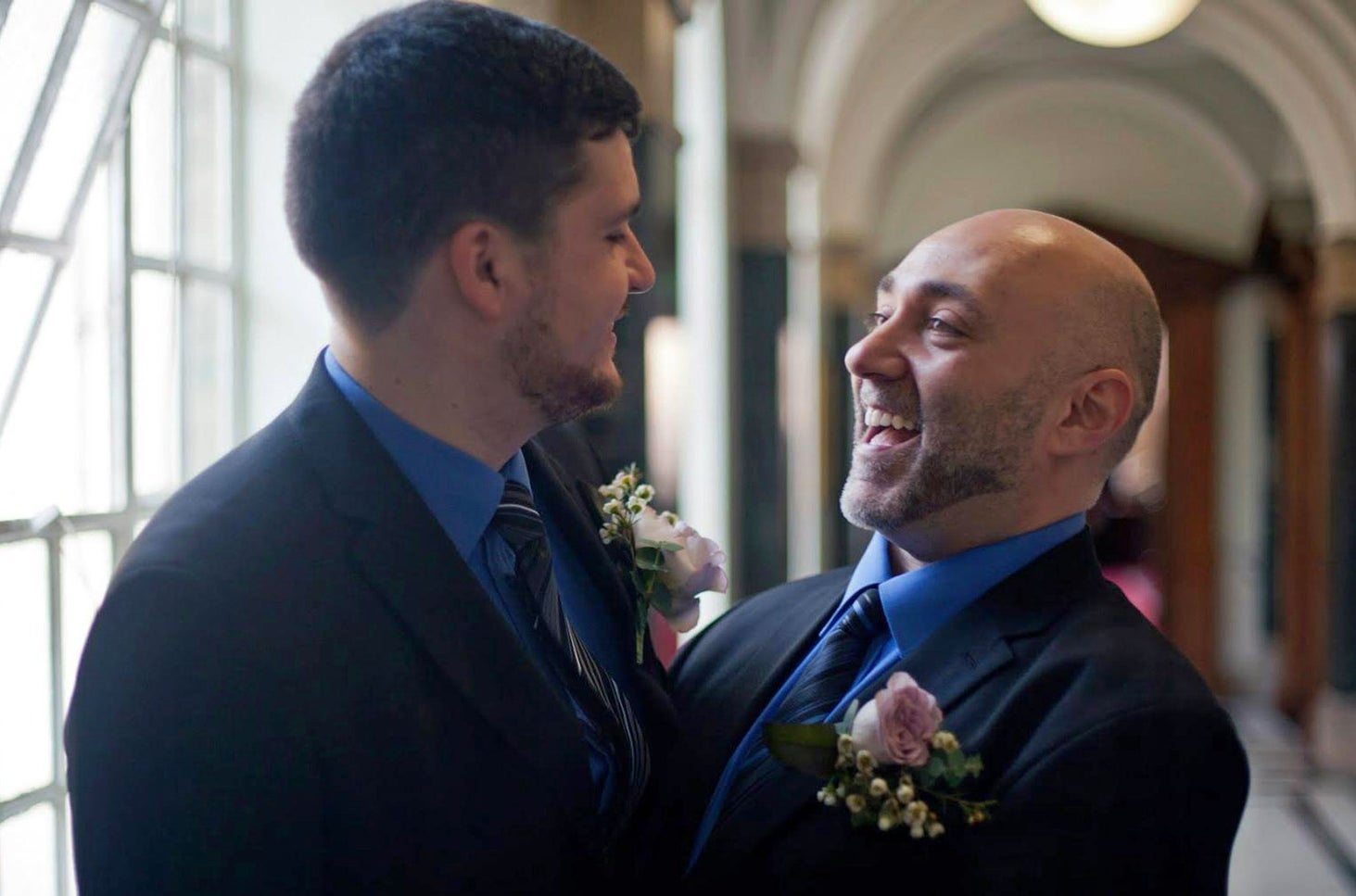
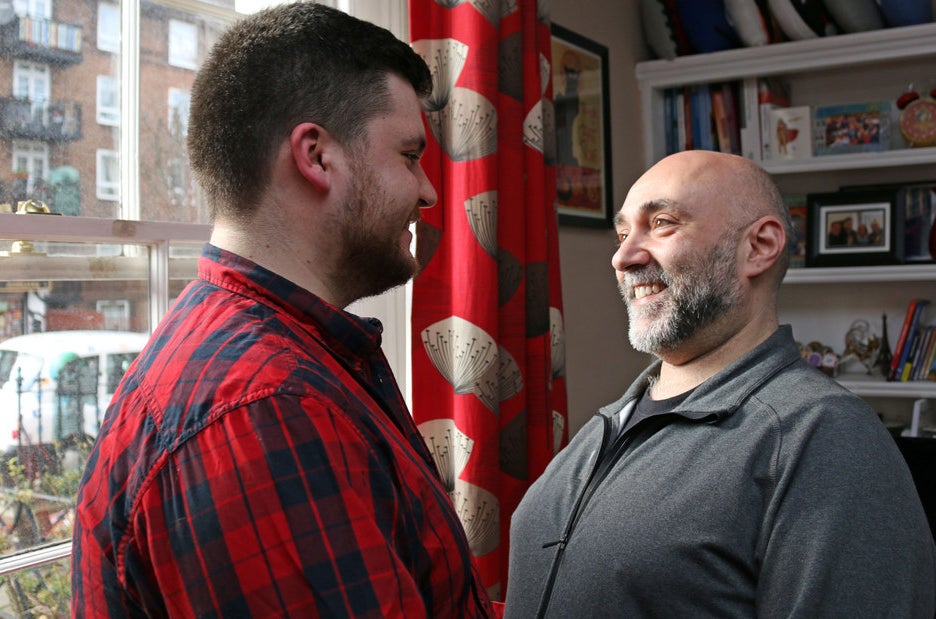
But by then you must have known same-sex marriage was going to happen?
L: No! This is how I got trapped [laughing]! After he proposed I said, “If we can get a date on the first day then we’ll do it on the first day,” thinking that would never happen and of course then it did, and we got the first slot at Islington Town Hall. He turned into Bridezilla. I called to tell him we got the slot and when I came home from work that night he had already ordered invitations, the cake toppers…
On the day, did you feel the sense of history?
A: Yes! They even flew the rainbow flag on top of Islington Town Hall. It was brilliant, just to know we’re part of history.
L: And for him it was the culmination of a whole coming out process.
A: I really needed to come out and I wanted to be as authentic as possible and live my life exactly as I wanted to. I’m so glad I managed to come out and be part of all this.
L: He had a whole load of messages from extended family who didn’t even know he was gay saying, “Oh we saw you on TV, we’re so happy for you!” I felt the historic thing but it felt personal to me like, “I can’t believe I’m getting married. Period. To anybody.” I never thought I’d get married. I was ready to be a spinster.
There was an old guy upstairs who died in the past year. I was modelling my life on him. He had his own place, by himself. I thought, “That’s where I’m headed.”
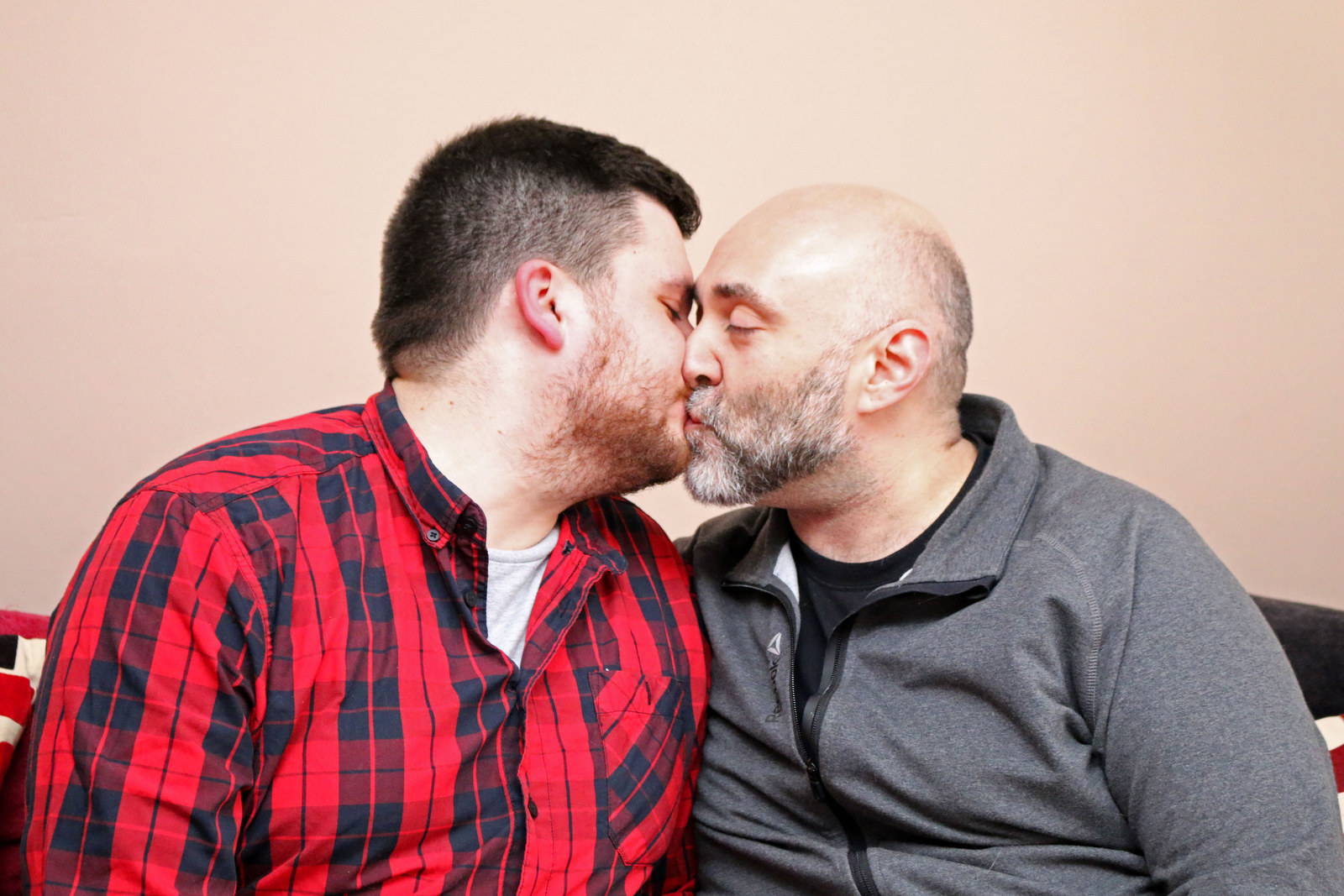
How did you feel when you were standing there exchanging vows?
A: I cried.
L: And the registrar cried too. She was properly blubbing. She was lovely – a lesbian, and this was the first gay wedding she’d done.
A: She was so happy for us and made sure we had the best day possible.
Why were you crying?
A: I was so overwhelmed with happiness, like, “I can’t believe I managed to find the husband of my dreams.” It was the happiest day of my life, I felt like I’d made history AND married someone I really love.
What happened after the ceremony?
A: We had an interview straight afterwards, live on the BBC, and we had all our friends and family around us. We’re walking down the steps and I can still see it in my head, I could see everyone around us and there were bubbles everywhere. We had bubbles instead of confetti. It was beautiful, absolutely beautiful.
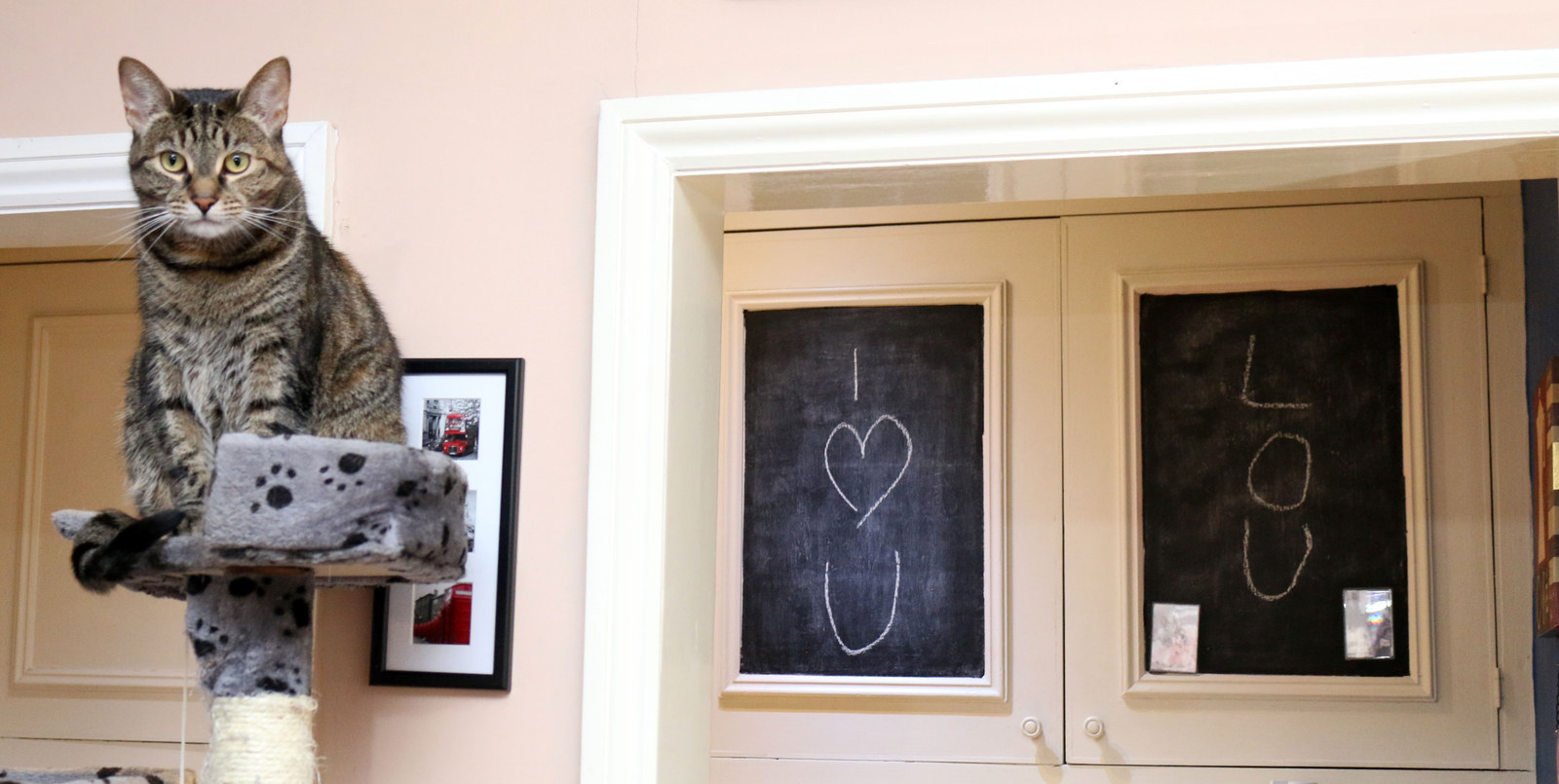
When did you know you wanted to be together?
A: Within four months of dating we went to Paris and Lille and that was the first time I said to him I loved him. I’d just woken up, I’m looking at him and he’s still sleeping…
L: And I wake up and he’s staring at me.
A: I start crying, saying, “I love you.” It was so monumental, I said, “I want to spend the rest of my life with you.” That was the moment I knew that I really wanted to marry him.
L: I was like, “Can’t we do this after coffee?”
How does it feel now to be able to use the word “husband”?
A: I don’t say it enough, I don’t know why. I don’t have anything to hide, “partner” is a go-to word, but it doesn’t mean anything less. I get these butterflies and think, “Oh my god he’s my husband.”
L: When I say “husband” it’s like, “I’ve put an end to all of that online dating misery because I got myself a husband!”
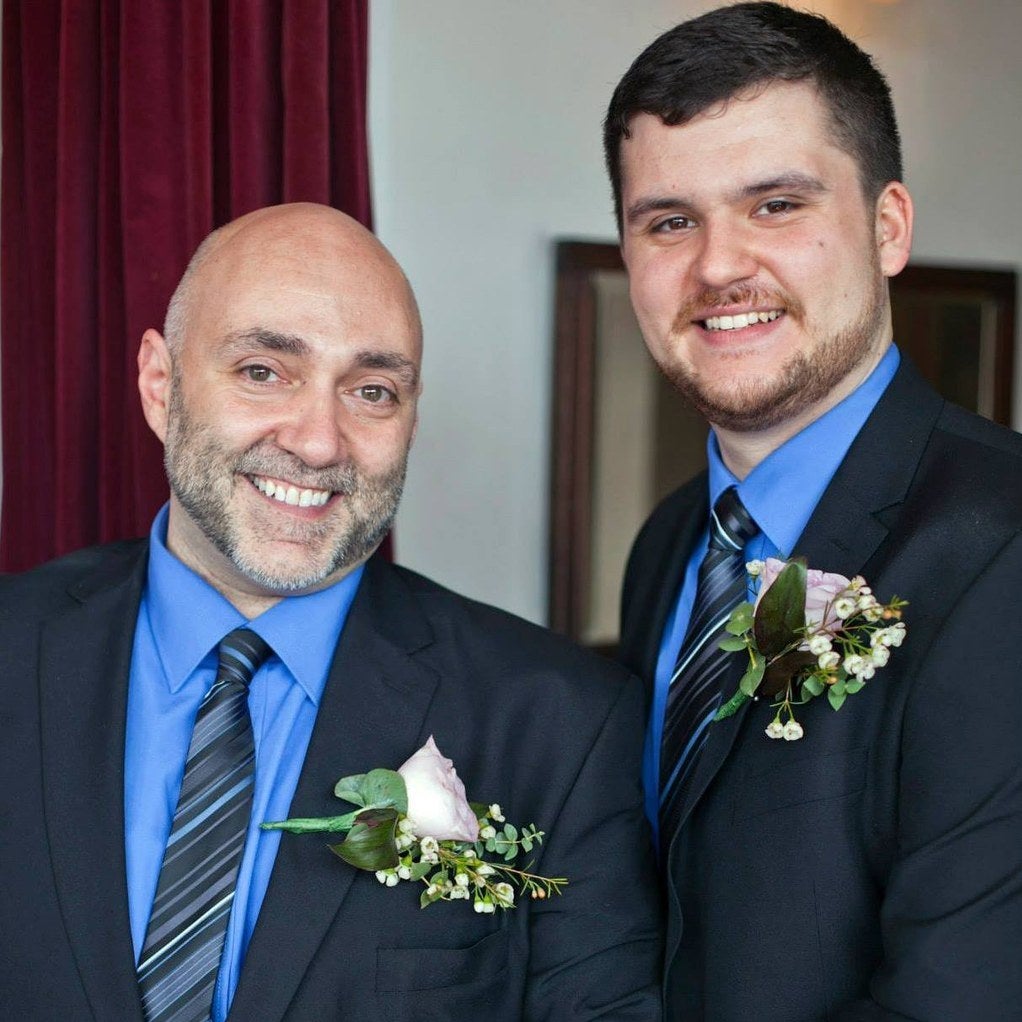

What difference has marriage made to you both?
A: It felt like we communicated better because I felt more connected to him, like, “We are going to share our lives together, I want to share everything with you.”
L: And we don’t have to worry about rights being taken away from us. From an emotional level, now when we argue, it’s like, “You’re my husband.”
So when arguments arrive, you just think, let’s sort it out?
A: Well, it ends up being flowers.
L: We suffer just like straight people [laughing]. But no, it makes the commitment stronger, it’s a marriage now. It’s just… different.
